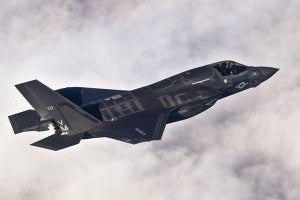Dutch Parliament Votes to Ditch the Joint Strike Fighter
Luke Coffey /
The bad news: This week the Dutch parliament voted to scrap Dutch participation in the F-35 Joint Strike Fighter (JSF) program.
The good news: Since the Dutch government dissolved back in April, and there will be a general election later in the year, the vote is non-binding. Nevertheless, this should serve as a wake-up call to the Obama Administration.
As part of Obama’s defense cuts, in January 2012 the U.S. announced a delay of five years for its first batch of 179 JSF aircraft. Sadly, many of America’s allies have interpreted this delay as a vote of no confidence for the JSF program. This has had consequences.
The United Kingdom has reduced and delayed its order of JSF. Italy has cut its acquisition of JSFs from 131 planes to 90. The future of Canada’s role in the JSF program has recently been thrown into doubt. Turkey, although continuing to pledge a total acquisition of 100 F-35s, has slowed down the pace of its order. Australia has announced it is delaying its purchase of the F-35.
Understandably, the logic behind many of these cuts and delays by America’s allies is: “If the U.S. can delay and cut, why can’t we?” So much for America leading by example.
For the Dutch, cancelling the JSF program would be a blow to NATO. The Dutch are one of the few NATO countries that actually has a capable air force that they are willing to use. The Royal Netherlands Air Force (RNAF) has provided close air support to NATO troops in Afghanistan, contributed to NATO’s Baltic air policing mission, and recently flew patrols over the skies of Libya.
Without the JSF, the RNAF will be without a fast jet capability after 2025, when their F-16s are expected to leave service. If they choose to procure anything other than the JSF, put simply, it will be outdated before it leaves the tarmac.
There is a nuclear deterrence aspect to this as well. Dutch F-16s and their F-35 replacements are dual-capable aircraft—meaning they can also deliver NATO’s tactical nuclear weapons if required. A Dutch failure to procure the F-35 would create an additional problem inside NATO regarding the future of its tactical nuclear weapons.
From a purely economic point of view, a decision to cut the JSF would also mean cutting Dutch jobs. As part of the Dutch participation in the JSF program, the defense sector is expected to win several important contracts worth tens of millions of euros for the manufacture of various component parts of the JSF.
It is anyone’s guess what will happen to the JSF program if sequestration kicks in early next year. If the U.S. keeps delaying or even cuts parts of the JSF program, America’s allies are likely to do the same. This would weaken NATO, weaken America, and embolden future adversaries.

